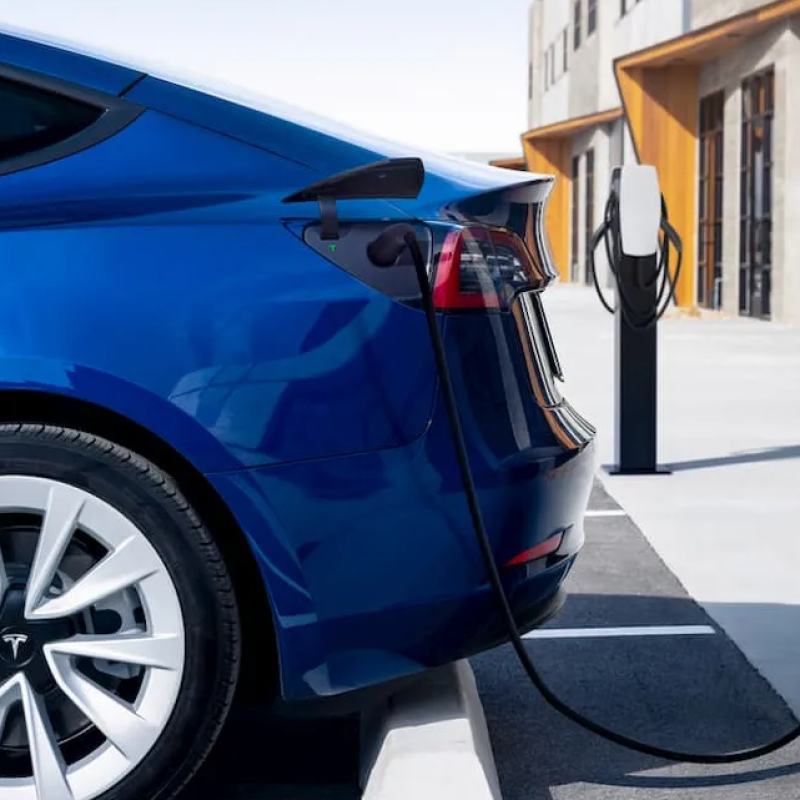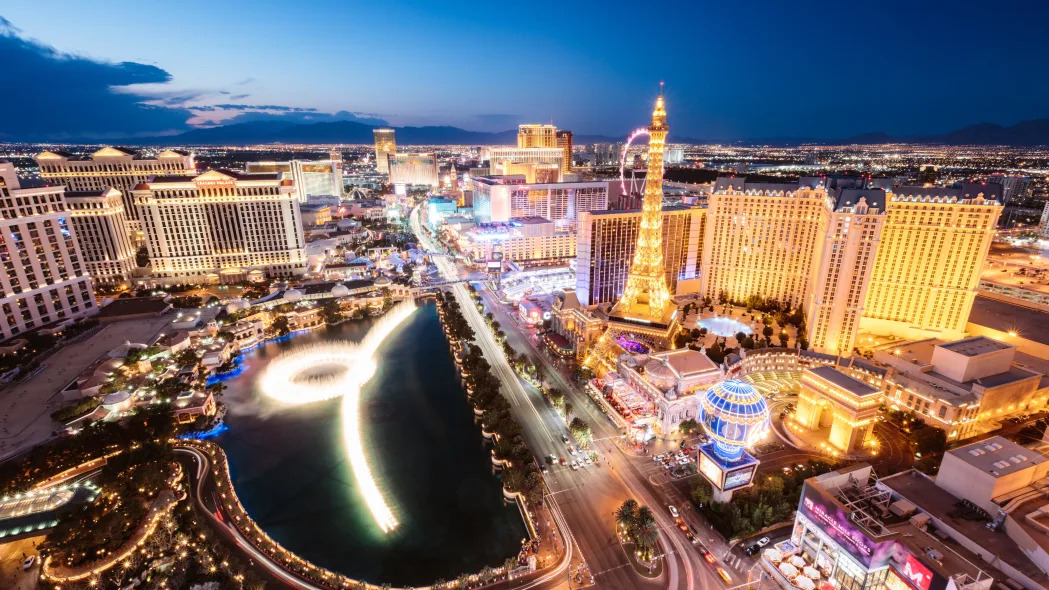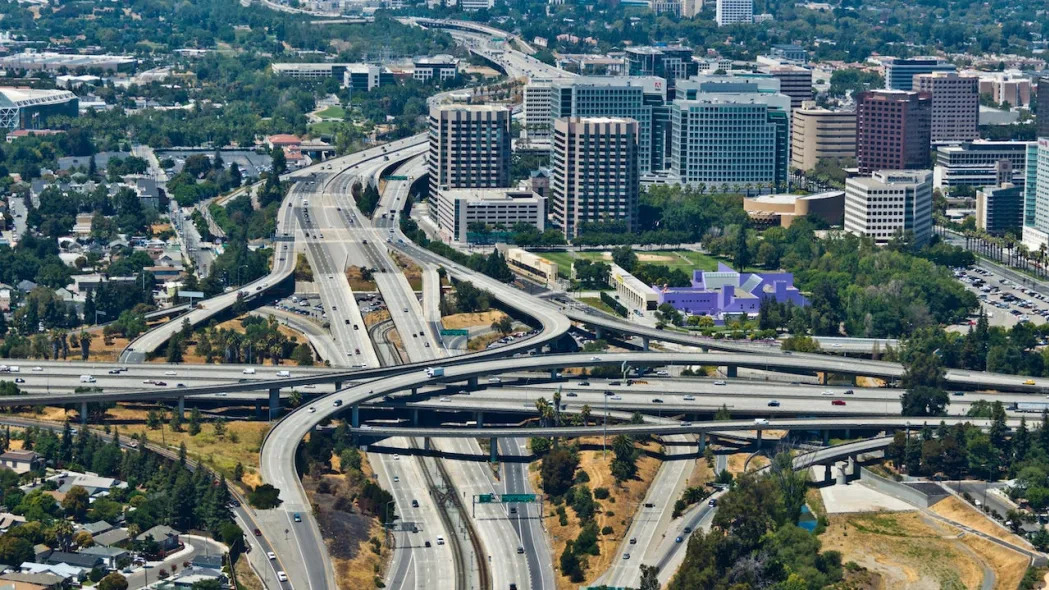20 best cities to own an electric vehicle
Category: Alternative Energy
Via: outis • last year • 232 commentsBy: Insider via Autoblog Apr 11th 2024 at 8:05AM (Autoblog)


Owning an electric car can be a headache, and where you live can make it easier or harder.
Here are the best places for EV drivers.

Not many surprises, here, with San Francisco and Boston near the top.
Is Austin really in Texas?


- Electric vehicle ownership is on the rise, with 1.2 million cars sold last year.
- Realtor.com and Kelley Blue Book ranked the top 20 US cities for EV owners to live.
- Cities that ranked highly have more homes that can accommodate EVs and more public charging ports.
2023 was a banner year for electric vehicles, with a record 1.2 million sold in the United States — about 8% of all cars sold, according to research firm Kelley Blue Book.
But for climate-conscious car buyers, the EV lifestyle requires more planning than just driving off the lot.
To ease range anxiety, EV buyers want to either charge overnight at home or live close to a public charging station. Those factors make where you buy a home just as important a decision as which model you drive.
Following the explosion in electric-car popularity, home-listings site Realtor.com partnered with Kelley Blue Book, which is owned by automotive-technology firm Cox Automotive, to identify the top housing markets for EV drivers.
The researchers weighed two factors. First, the percentage of homes in a market that advertised their friendliness for electric vehicles, including at-home charging stations. Second, the density of electric vehicles compared to available public charging ports.
Many of the top markets are — not surprisingly — clustered around tech and startup hubs like San Francisco, Boston, and Salt Lake City. California dominates, with eight metropolitan areas in the top 20.
Of course, the market for EVs is still small. In and around San Jose, a city an hour south of San Francisco that is home to a number of tech companies, only about 5% of listings mentioned electric vehicles — but that was the most of any metro area.
Those figures could rise as homeowners take advantage of federal rebates and tax breaks to install at-home electric-car chargers. The Biden administration is also subsidizing public charging infrastructure.
Some home sellers, though, are already touting their EV-readiness for a competitive edge. A three-bedroom townhouse in San Jose, on the market for almost $1.3 million, boasts a "2-car garage with 220v outlet to charge your electric vehicle."
"Mirroring the rise in the number of electric vehicles, the share of homes marketing EV-friendly characteristics on Realtor.com is growing over time," said Danielle Hale, an economist at Realtor.com.
Read on for the top 20 metros for electric-car owners, as determined by Realtor.com and Kelley Blue Book.
20. Las Vegas, Nevada 
Share of EV-friendly listings: 1.1%
Number of EVs per public charging port: 28
19. Fresno, California 
Share of EV-friendly listings: 0.7%
Number of EVs per public charging port: 14
18. Portland, Oregon 
Share of EV-friendly listings: 1.7%
Number of EVs per public charging port: 32
17. Portland, Maine 
Share of EV-friendly listings: 0.8%
Number of EVs per public charging port: 13
16. Honolulu 
Share of EV-friendly listings: 2.1%
Number of EVs per public charging port: 36
15. Riverside, California 
Share of EV-friendly listings: 2.6%
Number of EVs per public charging port: 33
14. Oxnard, California 
Share of EV-friendly listings: 2.9%
Number of EVs per public charging port: 40
13. Atlanta, Georgia 
Share of EV-friendly listings: 1.3%
Number of EVs per public charging port: 19
12. Sacramento, California 
Share of EV-friendly listings: 1.9%
Number of EVs per public charging port: 26
11. San Diego, California 
Share of EV-friendly listings: 2.6%
Number of EVs per public charging port: 30
10. Denver, Colorado 
Share of EV-friendly listings: 1.6%
Number of EVs per public charging port: 20
9. Washington DC 
Share of EV-friendly listings: 1.6%
Number of EVs per public charging port: 19
8. Los Angeles 
Share of EV-friendly listings: 3.1%
Number of EVs per public charging port: 29
7. Austin 
Share of EV-friendly listings: 2.0%
Number of EVs per public charging port: 24
6. Durham, North Carolina 
Share of EV-friendly listings: 1.7%
Number of EVs per public charging port: 21
5. Seattle 
Share of EV-friendly listings: 3.3%
Number of EVs per public charging port: 29
4. Boston 
Share of EV-friendly listings: 1.3%
Number of EVs per public charging port: 13
3. San Francisco 
Share of EV-friendly listings: 3.8%
Number of EVs per public charging port: 29
2. Salt Lake City 
Share of EV-friendly listings: 1.6%
Number of EVs per public charging port: 17
1. San Jose, California 
Share of EV-friendly listings: 4.9%
Number of EVs per public charging port: 24
Read the original article on Business Insider







Casper seems to be missing...
Casper Wyoming? That's surprises you?
It shouldn't, considering that the entire state only had 500 EVs as of 2022, it might have gone up a couple hundred more in the past 2 years.
Unless your talking about some OTHER Casper, in that case I can't say.
It's was a joke, Mark.
The ideal place for an EV is sitting in a two-car garage that also contains a gas-powered vehicle.
And if you live within a mile or two of work and have a migrant servant to recharge your EV, then your EV is for your brief work commute.
That gas powered vehicle is for everything else.
I hope I was of some help.
What could possibly be the point of making such a ridiculous statement?
If you own an EV then you likely have a range of ~270 miles per charge. That means you can make a commute of up to 135 miles away (270 miles round trip). When you are back home, plug in your vehicle and you are ready for the next day.
You do not need a migrant servant to plug in your vehicle. You do not need to live within 2 miles of work.
EVs are very practical for local travel. Having ~270 miles (even if you have an EV with less) is usually plenty of range for local business.
EVs for long distances (e.g. for a salesperson who routinely drives hundreds of miles a day) are not a great choice unless the individual follows a route with sufficient high speed chargers. But even that is changing at a rapid pace.
It is not ridiculous. An EV is extremely limited, costly and takes a long time to recharge. And you know that.
When you are back home, plug in your vehicle and you are ready for the next day.
To what? Do you have a charger at home? Tell us how much that cost and how long it takes to charge the car.
You do not need a migrant servant to plug in your vehicle. You do not need to live within 2 miles of work.
I said that would be ideal and you know that as well. I was emphasizing the fact that an EV is a major inconvenience compared to a gas powered car.
EVs are very practical for local travel.
No, they are not . They even have problems with cold weather:
Typically, an EV will cover around 20 percent fewer miles in cold weather versus beach weather. When it comes to putting electrons into the battery, freezing weather hurts in two regards. It limits regenerative braking, so the car recoups less power and drivers can't rely on one-pedal driving.
Why Electric Cars Struggle in the Cold—and How to Help Them | WIRED
If EV's were what you claim, your dictator president wouldn't have to mandate their production & use.
Ford as well as other auto makers are bleeding money on them.
And here you go moving the goal post. Here is what you wrote (and I quoted you in my post so you have no excuse):
I responded to the parts in blue. They are both utterly ridiculous ... having no tie to reality. Extreme hyperbole like this destroys one's credibility.
And of course you cannot defend this so you switch to a different argument that EV's are extremely limited, costly, and take a long time to recharge. So I will now address your new set of claims at your new goalpost location:
Extremely limited : Vague, but I suspect you mean range. The average range of contemporary EVs is ~270 miles. That is not extremely limited by any definition. The availability of recharging stations is a fraction of gas stations but that is what one would expect for an emerging technology. Nonetheless, there are plenty of recharging stations around to make a long trip. One must map them out (inconvenient) but this will improve. So 'extremely' appears to be more hyperbole (albeit moderated from the utterly ridiculous nonsense you posted @2 ).
Costly : There are low cost EVs (e.g. the Chevrolet Bolt) so this argument is growing weaker each year. As one would expect. That is how technology works.
Take a long time to recharge : Yes they do. That is the major drawback today. And, yet again, this continues to improve.
What has confused you? I stated that when you are back home you charge your car and then you are ready for the next day. You have the entire night to charge so you can even have a low-tech charger.
No, you did not. You used ideal regarding having an ICE vehicle alongside your EV. You are dishonestly trying to take a word in one sentence and magically write it into another sentence expressing a different point. Read the quote at the top of this comment; no 'ideal' in it. And if so, that would not even make any sense. This migrant worker crap is insane hyperbole. Plugging your car in when you arrive home is not a major inconvenience. It is simple to do. But one does need to plan their charges. Different technology means different usage patterns.
Yes they have cold weather problems. That does not make the impractical. No technology is perfect. Do you think the ICE vehicles were perfect when they first emerged into the public market? Problems wither away as a technology continues to emerge.
What did I claim that you object to? Be specific. I have been addressing your truly ridiculous hyperbole. If you have a problem with a claim of mine then name the claim instead of putting up a vague smoke screen.
On top of this, Biden is all of our president. Deal with it. And Biden is NOT a dictator, more ridiculous hyperbole.
“Ford as well as other auto makers are bleeding money on them.”
Many auto makers, ford included, have hit the skids on ev production because they are not selling. People are coming to their senses and realizing the tech, among other things, isn’t there yet.
Over-equipped behemoths aren't selling. GOSH!
The mustang mach e is a behemoth? GOSH! The chevy blazer is a behemoth? GOSH! The chevy equinox is a behemoth? GOSH! None of those are “behemoths.” It’d be nice to have an actual fair and honest conversation about this subject but i gave up on that a long time ago.
People have no problem buying the gas versions or equivalents of these vehicles. Face it, they don’t want ev’s because ev’s and everything that goes along with ev’s are not ready for the masses.
Every bullet-point! Donald would be proud.
If he ever gave a thought to his foot-soldiers.
It’d be nice to have an actual fair and honest conversation about this subject but i gave up on that a long time ago.
Yes and it has been obvious for a long time you quit trying...
I’m not the one avoiding the uncomfortable truths about ev’s, the ev fanatics are. Try again.
EV fanatics?
You claim to want an "honest conversation about the subject" while tossing out hyperbolic nonsense like this.
An honest conversation would be one that recognizes pros and cons in both ICE vehicles and EVs. One that recognizes that EVs are an emerging industry with all the normal challenges and market ebbs and flows that come with that.
Those who see value in EVs are not ipso facto fanatics.
[✘]
I agree totally
Thank you for this excellent example of anti-EV disinformation.
Your grandchildren will curse you as they suffocate...
You actually believe all the climate change malarkey? It was warmer in the '30's than it is now.
The weather that's actually happening now is not what the computer models have predicted.
And thank you for your climate activism.
Please read:
Why Electric Cars Struggle in the Cold—and How to Help Them | WIRED
Believing is one thing, mandating things that people don't want is another.
A six-year-old article about a rapidly evolving technology.
Seriously?
And what will they be suffocating from?
I just watched a Neil deGrasse Tyson video on Youtube and he was going on about how the sea levels would rise and fall depending on the amount of ice was locked up on land and I'm like yes, yes I think he's got it, all he has to do is keep going with that thought and he'll realize we aren't the problem with the warming, but that is where he stopped and said that where all the coastlines are now is what a stabile climate will allow, but then he claimed that what man is doing is going to cause places like Florida, NYC, and all other low lying areas to go under water when he knows full well that before every ice age and the next one the sea levels will rise that much with or without us. He may be brilliant but....... Nah I'll leave it at that.
Your grandchildren will join Vic's.
Funny that just about every one of those cities are heavy duty blue cities in blue states that have the size and money to support the EV infrastructure needed. As I have said before, I live in a small rural desert community on the AZ/Mexico border with the nearest big city being 2.5 hours away, so owning a EV in my neck of the Sonoran Desert is just totally impractical for me. I'll stick with my 2015 Chevy Silverado 1500 pickup that I know has the distance capability that a EV lacks.
Are you aware that, globally, blue states subsidize red states?
States don't subsidize other states.
Some states send more money to the federal government than they receive. They're generally blue.
Some states send less money to the federal government than they receive. They are generally red.
I'm surprised that someone as erudite as you didn't know this.
Yes, they do, by Federal taxes.
No they don't.
[deleted]
[Tessy is not the topic][✘]
And California leads the pack with actual welfare cases and expenditures.
1/3 of all welfare recipients with only 1/6 of the population.
So... California is taking care of of its people. Do you think that is a bad thing?
With a debt of ~59 Billion dollars, how can California take care of its people?
" California’s state and local government debt is roughly $1.6 trillion , which includes a proper accounting of the state’s unfunded liabilities. To put this in perspective, this works out to about $125,000 of debt per California household and exceeds the annual GDP of all but 13 countries ."
So?
Big numbers are not intrinsically significant.
You might want to look at this:
Most Federally Dependent States
"WalletHub compared the 50 states in terms of three key metrics: the return on taxes paid to the federal government, the share of federal jobs, and federal funding as a share of state revenue."
Not to mention National Parks, Military installations, Federal Buildings............well you get the drift
New Mexico is always number 1 or Number 2 do you think is is because of welfare dollars or is it because they have places like Los Alimos nuclear research facility? almost 20% of federal tax dollars going to NM is from the department of Energy, I don't think it is for windmills.
States don't send money to the federal government, individuals and businesses do.
The formula in most of these "surveys" is suspect. For example, should federal dollars that pay federal wages to workers, Service members, etc. be counted. Should support to NA reservations be counted? Why not count as a cost, tax credits and deductions to people by state, etc.?
Doesn't also the SALT deductions have something to do with this. Blue states typically have high SALT but allow people to deduct that from their federal taxes and they get the federal dollars back to cover the SALT, sort of a back door way of receiving federal dollars by heavily taxing the people and businesses in their state, which they then get refunded. Michigan doesn't have that deduction so the people aren't as easily duped into having their taxes raised with the promise of the deduction to help reimburse their SALT liabilities.
Indeed. Those surveys seem to be based on dubious analysis and are designed to make some political point.
I can easily see why my state ranks where it does.
And a lot of it has to do with property taxes.
Even the federal government has to pay taxes.
And considering the federal government either owns or administers about a good third of the state, that's a pretty healthy chunk of change.
That's why the state and the feds negotiate a contract they call PILT ( payment in lue of taxes).
That contract keeps the feds from having to deal with annual fluctuating tax rates and gives them a set base amount they pay for a specific determined amount of time, usually renegotiated every 10 years., and covers anything from a patch of land in the middle of nowhere, to a simple federal government office building.
It helps the feds with expenditures, and the state with being able to form a budget.
Not all federal money sent to a state is a gift from the feds.
Seriously? This is your best "thinking"?
... which they make pretty well.
The list is impressive.
"Best", no, hardly qualifies as thinking at all. I'm surprised that there are adults here that think that states pay the feds taxes.
What political point does it make to you?
Yes, and there is a 2nd National Lab, Sandia, in Albuquerque. 10% of their population Native American. 3 AF Bases and White Sands Missile Range. In a small population state, those federal wages and contracts add up.
What does it say about red - blue politics? Absolutely nothing!
Been to San Francisco or Los Angeles lately?
No. Why?
Because they are two of the filthiest cities in the country. Tent cities in public parks and on downtown city streets with drugs bought, sold, and used in public. People relieving themselves on sidewalks. Rampant crime rate. They are also cities run by Democrats. You think they are taking good care of their citizens? Some parts of those cities you'd need M1 Abrams tank to feel safe.
You know it's bad when Christian Louboutin, Lululemon, Nordstrom, Old Navy, Williams-Sonoma, Office Depot and Whole Foods begin fleeing downtown.
My first visit to SF was in 1977. I lived in Monterey from Jan 1981 to May 83 and frequently visited SF. My last visit was with my wife in 1995. I thought what an interesting city, would never believed that it could collapse as it has.
800 unintentional drug deaths last year. 2,500 Aggravated assault, 2,750 robberies, in a city of 800,000. Of course there are still wealthy, clean and safe neighborhoods their which makes the concentration of despair and violence more pronounced in the Tenderloin District, Castro, Hunters Point, Mission District, Chinatown, Ocean View, North Beach, Outer Mission, Western Addition and South of Market.
I wonder why those people aren't in some red city? Perhaps they feel better taken care of?
Such a hell hole!
And still they come.....
I think SF population peaked 6 years ago, LA in 2015.
Sounds like it is time to talk to your local politicians, EV chargers were part of the infrastructure bill, so you just need to encourage them to spend a little of it in your area.
Public chargers are nice and more important to people who don't own a garage for overnight charging. Problem is that many of these people can't afford who can afford neither an expensive vehicle nor a house with private parking. Problem is that many of these same people can't afford a $50,000 and $60,000 vehicle, even with a major government subsidy.
EVs are inevitable, just not yet.
Bingo!
Drinker,
There are many EV's that are way under $50,000. Read this article:
And when you buy them, there is a discount program, if not totally free, to have a charging station put into your home.
But this is his larger point. If you don't have a home, you're kinda screwed. In the city, there are an awful lot of people who live in apartment buildings. Just because you have an EV, that doesn't mean the landlord has to put in a charger for you. And even if he does, what about the other people - dozens? hundreds? - who live in the building? If a substantial portion of them buy EVs, there will never be enough chargers.
This is another consequence of the North American obsession with single-family homes. In other, arguably more civilized countries, apartment blocks have chargers.
One for every unit? Neat.
How many? If the building has 100 apartments, are there 100 chargers? 50? 10? And while I can imagine that there might be some buildings with multiple chargers, I wonder how many buildings have any, much less enough to satisfy demand.
Even in my little city of 26K people there are still a lot of people who don't have off street parking at their homes, let alone rental units. Necessity will be the mother of invention...
To make this a viable solution charging times have to come way down and batter life has to improve more. Similar to fossil fuel cars where I can gas up in 5 to 10 minutes at a station and not have to do so again for several days. We are getting there, but not there yet.
Thanks Perrie, it was a longer list than I expected. I think the only EV that gets the full $7,500 tax credit is the Tesla Model Y and one variant of their Model 3. They both use cheap materials in the interior and of course you have to be willing to face your friends with an Elon Musk car. The Leaf gets partial tax credit but it has an unique charging system that some public chargers can’t accommodate.
Dunno. I'm not the builder. My guess would be a number based on the average number of EVs per household.
They're never going to have a marked share more than 15 to 20 percent in the US.
They're still too expensive, impractical, and unreliable to be considered by the average person in the US. Plus a lot of them catch fire.
Worst of all, they will have negligible to no effect on climate change, too many sources of greenhouse gases that can't be mitigated.
I'm sure that's what the horse and buggy people also said.
By 2035 most car manufactures expect to see more ev sales than fossil fuel cars.
At present, taking into account all aspects of mining, drilling, manufacturing, maintaining and operating vehicles - evs have 17% less of an impact on the environment than fossil fuel cars. That number will continue to grow in favor of evs as all aspects as the technology progresses.
Gee, that's swell. Too bad we can't close the airports and keep these people where they are. But, no, these EV lovers are only gaslighting everyone into ignoring the tons of Jet A they burn, just to enjoy drunk sex in Cancun.
The close proximity to an international airport makes EVs pointless. That EV in the driveway won't even offset Amazon Prime. But, hey, this really all about the money, after all.
Nerm,
That is not true. Planes are far more efficient than cars. You might want to read this:
Also:
In 2012, the most recent year counted, driving one person one mile took 4,211 BTUs, while flying required just 2,033 . The numbers for driving are based on the average fuel economy of all light-duty vehicles (that's passenger cars, SUVs, pickups, and vans, which averaged 21.6 mpg), using data from the US DOT
How much fossil fuel does an EV burn? The whole point of the seed is to gaslight people into replacing ICE cars with EVs.
But that EV in driveway won't offset Amazon Prime. In fact, adoption of EVs will foster greater dependence on aviation for long distance travel. And we aren't just flying people around. Freight has become a large share of aviation fuel consumption.
Aviation isn't nearly as efficient as rail for long distance transport of freight and people. There really is a reason Europe has invested public money in an extensive rail transportation system. Trains can even be electrified to eliminate dependence on fossil fuels while aircraft cannot. So, why aren't we investing more in rail transportation for both passenger travel and freight?
Parking more EVs in driveways won't solve the problem with aviation; that's going to exacerbate the problem with aviation. Constructing an electrified rail system would be much less technically difficult and, I suspect, less costly in the long run. But, then, the transition away from fossil fuels has really been about the money and not about the environment.
(You know, an electrified rail system would provide an additional benefit of a grid system to support EVs.)
What do you base any of your comments on?
As for Amazon, they are going EV. Read this:
.
And how do EV's foster dependence on long-distance travel? Most people use their cars daily and within a 50-mile radius.
If you are going to make comments, please back them up.
Haven't you seen reporting about holiday travel? Anyway, here's some statistics for you.
According to this source there are about 3.2 trillion passenger miles traveled by cars, trucks, buses, etc.
According to this source there are about 1.0 trillion passenger miles traveled by air. (Apparently this includes international air travel which I interpret as originating in the US; I may be wrong in that interpretation.)
The statistics do indicate that 1/4th of miles traveled in the US is by air. The data is not sufficiently granular to make a WAG about how much ground travel is associated with air travel.
The statistics for holiday travel (based on trips of more than 50 miles) indicated that ground travel dominates holiday travel. While the numbers do support the reporting that airports are overwhelmed screening passengers, 90 pct of holiday travel is by car, truck, bus, or other ground transport. I haven't found data that breaks out passenger miles traveled over the holidays.
Bottom line is that passenger travel by air is a significant portion of passenger miles traveled. The transition to EVs would not reduce the number of passenger miles traveled by air. And it is reasonable to expect that the problems of EV range would contribute to an increase in passenger miles traveled by air. It's a reasonable expectation that Americans would pay more to travel by air to avoid the inconvenience of travel by EV.
I do not think so. If someone was inclined to make a long trip by driving, they are unlikely to switch to air with the increased price, all the wasted hours in preparation, the lack of control of schedule, and the need to then pay for transportation at the destination simply because of the need to schedule charges.
Even if your EV has a ~270 mile range (median range), stopping to recharge after ~250 miles is hardly a show stopper. And most people who chose to drive rather than fly are looking at trips that can be driven in a day (or a long day). Much more than that causes people to shift to train or air.
Further, EVs with ranges over 400 miles per charge already exist and the range will continue to expand with time.
That won't eliminate the need to find a working charger that is accessible. The reporting so far has indicated that problems with the charging stations contribute to range anxiety. Running out of gasoline can be addressed with a jerrycan. But running out of electricity requires a tow and may brick the vehicle. Keep in mind that the current trend for EV development is to produce a disposable consumer product. Commercially EVs have more in common with smartphones than with automobiles.
A nuclear battery would provide unlimited range and never need charging. But the state of technical development is not the barrier to adoption. Secondary considerations (such as safety and environment impact) are not easily predicted. Those rosy projections for technical development ignores the potentially insurmountable obstacles arising from the regulatory environment.
You are stating the obvious. Yes, of course, an EV must have a charging station just like an ICE vehicle needs a gas station.
Seems to me you are focused on trying to identify the downsides of an emerging technology while ignoring the upsides. Note that the ICE technology still has many downsides. Balance, here, is important.
Yes, and it is a safe bet that better engine technology will continue to emerge. And it will have upsides and downsides. It is not good analysis to focus on a few negatives and dismiss everything else.
Are you sure? Do you have a credible source?
What emerging technologies are you talking about?
Are you implying that batteries can be improved to the point of equaling the range of ICE powered vehicles?
Do you observe the history of technology, Greg? If not, here is the key takeaway: technology continues to improve. The functionality gets better and the price (typically) grows lower.
Beyond!
And you are over simplifying the obvious. All vehicles require a refueling or recharging station that is compatible and reliable. The R&D on batteries does not address the deficiencies in charger compatibility and reliability. The battery range is unimportant without a network of compatible and dependable chargers.
I'm not being a Pollyanna. The reality is there are a host of problems to be addressed before EVs can become mainstream. And those problems are not going to resolve themselves. Fast tracking the deployment of EVs will only create a charger crisis. That may be politically beneficial but will adversely impact adoption of EVs.
A nuclear battery is not an engine; it's a battery that produces electricity by capturing beta and alpha radiation. The process is not electrochemical, as with rechargeable batteries, but more like an electrostatic process. Nuclear batteries can be designed as a direct replacement for electrochemical batteries in existing equipment.
Pointing out deficiencies that must be addressed is not focusing on a few negatives to dismiss the technology. Raising concerns about deficiencies is good engineering practice. Failing to skeptically scrutinize new technology can result in catastrophe; just ask Boeing.
Yes, Nerm, ergo the push to build sufficient infrastructure. Evolution of a new technology like this requires steps. The infrastructure needs to be there to support demand and demand needs to be there to justify infrastructure. Same basic concept as when we change paradigms from horse-driven carriages to automobiles. I am sure there were plenty of Nerms back then making the same kind of argument.
And a ton of problems have already been solved. EVs will become mainstream over time. Again, evolution.
I do not know where this came from. I never made any claims about nuclear batteries.
Yeah, it is when the only thing you offer is nit-picking. Your argument is not balanced, it is an anti EV argument.
Electric vehicles are NOT exactly an "emerging industry", private electric vehicles started out right next to the ICE engine so they have been around just as long. And they had the same problems then as they do now.
I admit, they didn't get the same attention as ICE conveyance, nor did they keep up with tech advances over the years to make them more appealing and affordable.
Right now I consider what is happening is the bottle neck stage with a crapton of different methods and ideas all put out at once with no real standardization.
Some things I think need to happen before any sort of mandated sales can happen , is there has to be some government standardization of charging stations , as well as standardization of charging plugs, one would think they would have learned a lesson from cell phone charging and proprietary manafacturer type plugs.
It doesn't matter what "brand "or who made the vehicle, they all should have the same charging plug and perameters and be able to use the same stations, that's not currently happening.
I do think EVs have a place in the urban environment, maybe even outside that, individual requirements will dictate what works for the individual. I will happily let others be the guinea pigs while the bugs get worked out.
Right now the current admins mandate of all new vehicle sales , 40+% having to be EV by 2030, 6 yrs from now, is a fucking pipe dream that will not be met, but hey the guy mandating it won't be in office by then.
Being from the West I totally understand a reluctance to go electric for the obvious reasons. Today though most miles driven are related to daily commutes, school, church, shopping etc etc which are local even in Enid Oklahoma or Borger Texas or Winslow Arizona. Most families have more than one vehicle. A home charge is half the cost. The 40% target is a lot more doable than you suggest. People want the new technology, the better safety and to save thousand$ a year just driving around town...
EV maybe not for thee nor me, but why all the hostility?
Sure they are. Only recently has battery technology, motors and sophisticated software on microprocessors improved to the point where EVs became feasible and thus the beginning of a real industry. The EV industry (speaking as a real industry) is indeed in its early growth stages and qualifies quite nicely as an emerging industry.
This is the same with AI. AI has been around since the 1950s but until about 15 years ago the amount of computing power and available data was insufficient to learn to the level of being practical. In addition, the lack of highly parallel matrix-based computing power hindered AI researchers from discovering the curious emergent 'intelligence' of super large scale pattern recognition and how to architect systems to harness same. Now AI (machine learning) is an emerging industry.
The rest of your post is fine commentary on how the EV industry should mature.
It now takes twenty minutes to charge more than 200 miles. A coffee break.
Greg or Nerm might not notice your post since you did not reply to them. And they are the ones who might benefit from it.
C'mon Mark! That's an entirely misleading "truth". Battery tech in the 1910s couldn't compete with petroleum, so electric cars disappeared for a century.
Now the opposite is happening. When was the last major improvement in ICE? Maybe variable timing, thirty years ago? There are articles about battery improvements every week.
I don't understand such determined refusal.
Your free to think my taking the history of electric vehicles into account as misleading , but for me it's not. They faced many of the same problems as ice did back then , electricity itself was also a new game , remember the fight Edison and Tesla had over ac and DC and what should be standard?
Electric transportation was around for some times, remember old time above ground trolly cars in urban areas when they got rid of horse drawn ones? They are still used underground, they are called subways.
EVs got a shot then , just as they do now, right now EVs are used in mining, most of those really big pieces of equipment are electric, most trains are hybrids and have been for some time, the issue with all of that is size, even some of the things being suggested now where tried back then and didn't catch on for one reason or another, it is because of tech being revisited, which is good. Not some of the things thought of as new actually are ,it is forgotten it has already been tried.
The 2 issues I see right now are infrastructure, and shrinking the vehicle to size which material advancements and how they are applied are helping greatly,
.the other issue I see is batteries themselves, as an analogy I see it going through its leaded to unleaded phase of development that petrol did. And it has to go through its ethanol equivilant period as well. Way I see it , it's going to take time for it all to go through the growing pains phase, and it can't be rushed.
As for the determined refusal? It's more of an outright refusal in my case based on a number of factors pertinent to my personal situation, and it is me , myself and I that have to take those into consideration for myself and myself alone , no matter what anyone else thinks.
For myself , and that's all I can speak to, the 4 big things that lead to my refusal,
1. Cost , that entails total cost of transitioning individually.
2. Infrastructure, personally I think that's got a long way to go to catch up to what's in place.
3. Maintenance service, can't exactly take an EV to a non dealer mechanic or tire shop currently with expected results without having a specialist on hand.
4. This one is strictly me, utility, will it go where I want it to go , do what I want it to do, and do so reliably, taking the other three things into account.
Nerm,
Yes and by that logic, think about how much fuel they are using? Most people who travel by car, don't need to fly, meaning that they are less than 500 miles.
People traveling by planes are traveling more than 500 miles and planes expend less fuel per person than cars. And talking about specific times of the year, does not make up for the rest of the year.
This will come down to 10 minutes soon.
Jb , not hostility, more of looking at the issue realistically for my own individual circumstance, with how things currently realistically exist, like you said yourself, not right for me under those conditions and current situation.
If I feel any hostility, it's directed towards me for not going along with something I have determined not right for me and choosing not to individually, I'm not saying just because I won't , someone else shouldn't either, they are still free to make choices for themselves.
I drive halfway across the country and back at least once a year and it takes me that long to get gas, coffee and pee...
My Subaru will go about 400 miles between refills on the highway and that is about what will I want for an EV too.
Personally I nothing to fear about the inevitable transition to electric vehicles and only hope I live long enough to wear a few out. I love cars and have owned a lot of fast ones. The Mustang Mach 6 EV I tested would smoke any one of them.
You have got to drive one to appreciate it...
Lol, I'm still waiting (and dreading) the transition to the cars from the Jetsons, I know how people are about keeping their vehicles topped off..." I know my car" ( as the fuel indicator tickles empty).
Oh I can appreciate the newer things like that, still doesn't mean I would want it.
There's s-o-o-o much research going on.
Can't keep up.
Well, that shouldn't be surprising since stop-and-go operation adversely impacts fuel efficiency and the simple fact that environmental regulations have created obstacles to higher fuel efficiency. Believe it or not, a model T Ford was more fuel efficient than most of today's light cars. The automobile is a case study in how a regulatory environment can be detrimental.
And, as I pointed out, the transition to EVs will not reduce the number of air miles being traveled. We know that air travel was trending up before the pandemic. We know that the aviation system is bumping up against airport capacity. And air travel was increasing before EVs became an issue. The transition to EVs will not convince people to fly less. If the deficiencies and inconvenience of EVs aren't adequately addressed then it would be reasonable to expect more people would choose to fly.
Keep in mind that electric airplanes are targeting short distance travel rather than long distance travel. So, the transition to electric airplanes will be in direct competition with EVs. Essentially the transition to electric airplanes is utilizing the old promise of flying cars to justify development.
So, what point are you making? In case you haven't noticed, I'm not arguing against EVs. What I'm complaining about are enviro-phonies using EVs to protect their access to drunk sex in Cancun. These green freaks want to gaslight me just so they can rub Juliet's brass breast in Verona. And take a selfie. Scientists aren't traveling to Antarctica in electric vehicles. But they're special so their air miles don't count.
You know all the reporting on the environmental and climatic impact of aviation excludes emissions by the military. And military aircraft aren't nearly as fuel efficient as civilian aircraft. So, everything we're being told is a lie just to cover political backsides. Here's a Joint Rivet flight out of Offutt, NE. This is an old Boeing 707 burning fuel to accomplish what?
Because of their regenerative breaking Teslas can get better mileage in stop and go traffic than on an open road...
Gee, 1930s technology. Am I supposed to be impressed?
I wouldn't take a Tesla if it was given to me. Tesla has the styling of a potato and the software isn't stable. Tesla builds overpriced, unreliable vehicles. That's the kind of junk Detroit has churned out since the 1970s.
What I want is a small vehicle, typically marketed as a micro EV or mobility vehicle. But the regulatory environment doesn't allow them in the US. The Federal government is one of the biggest obstacles to transitioning to EVs.
If DOT would do something about underride crashes there wouldn't be market for monster trucks.
ICE with stop-and-go get better mileage than without.
Looking at that flight path, and being former USAF/SAC.... I would say that looks like a refueling mission flight path.
Now if it was over Poland or the Black Sea I would suggest that or an AWACS flight.
I think these are training flights for reconnaissance wings stationed at Offutt. I think TOPCT is a callsign for a RC-135W aircraft, based on the Boeing C-135 Stratolifter airframe. (The KC-135 air tanker and E-3 Sentry (AWAC) are also based on the Stratolifter airframe.) The C-135 was a shortened version of the commercial 707 airliner.
I don't know the capabilities of the RC-135 Rivet Joint. Here's what one looks like.
My next car is going to be an EV. We have a lot of charging stations in the tri-state area, and I would like to stop being dependent on fossil fuels.
Same here. I am waiting for the 2025 Mini Electric due to the poor range of the current model. Minis are at the low end of the range scale, but I like Mini Coopers in general so I am sticking with them.
So, you don't own one either. Please let us know when you have one.
Hopefully they will make them more practical soon.
I will likely have one in 2025. I am currently not in the market for a new car yet.
You clearly do not hope for that at all. But in spite of your desires, EVs will continue to improve just like every other mainstream technology.
The proof of that will be when people choose them, not the government mandating them.
EVs will continue to improve as long as there is a market. That is the point I was making.
Biden has taken it away from the market.
The final rule, which begins in earnest in 2027, demands that automakers quickly amp up production of electric vehicles. By 2032, the emissions standards dictate that roughly 70% of new vehicle sales be battery-powered electric or hybrids.
For comparison, EVs made up just under 8% of new car sales last year .
If automakers don’t fall in line, they risk hefty fines .
If you like your car, good luck keeping it. Biden's EV mandate drives change people don't want. (msn.com)
The market dominates.
Ultimately, consumers get what consumers want.
I really like the Kia EV6. I would have gotten one when I bought my Seltos, but they couldn't get them on the lot.
Going by what I see in NYC Hyundai's Ionic 6 is already a big hit...
What is all this talk about "mandates"? I am unaware of any political effort to either mandate EVs or ban ICE.
"They're comin' t' take yer guns!"
Almost affordable...
It looks best from behind it.
Lease deals look attractive...
I always buy. I'll reconsider it.
That is an amazing statement.
There are encouragements - tax incentives.
And ICE get huge fuel subsidies.
So?
Federal subsidies to support renewable energy formed nearly half of all federal energy-related support between fiscal years 2016 and 2022. Traditional fuels (coal, natural gas, oil and nuclear) received just 15 percent of all subsidies between FY 2016 and FY 2022, while renewables, conservation and end use received a whopping 85 percent.
What's really fascinating is that some people make up blatantly false "information"... and are clearly proud of doing so.
I have to wonder how their minds work m.
Do you mean that the government is favoring a technology that will help save the planet, against a technology that is destroying it?
And you disagree with this policy?
Geeeee.........
No, I disagreed with your erroneous assertion that “ICE get huge fuel subsidies”.
Not that I disagree with the thrust of the sentiments expressed, but from a geologic standpoint, the world is not being destroyed. We can affect the climate and necessitate large-scale relocation, even be a large factor in the extinction of many species, but we will not come close to destroying the planet. The ecology of the planet is quite a different thing
Your disagreement is erroneous.
Shorthand
Nope, maybe a graph will be more understandable than text for you:
It's sometimes difficult to distinguish among smug disingenuousness, ignorance, and stupidity.
If it will help, I’ll self identify if I ever employ them.
All well and good for you, but not in my area. I refer you back to post #3 above.
The leading advocates for an EV don't own one. Interesting.
Who are the leading advocates for EVs?
You are obviously one of them. Why don't you have one?
Oh you mean the people on this article who are in favor of EVs. Not the actual "leading advocates".
Because, as I noted, I am not yet ready to buy a new car. I am not ready to buy an ICE vehicle or an EV. My current car still meets my needs and is young enough that it is not time to get another one.
When it is time, and I think maybe next year will be right for me, I am seriously looking at buying an EV.
You are aware, right, that EV technology is still an emerging technology? So it should not surprise you that most people currently have ICE vehicles. And that fact is not an argument against EVs but rather an obvious condition of ICE being the dominant technology for well over a century.
Yes. When they become equal to the convenience and dependability of a gas-powered car, then and only then will I consider it, until then I will be hammering away at those of you who are advocating for the terrible EVs.
Again with the absurdly over-the-top hyperbole. EVs are not terrible. The current EVs are very good products. They are clean, fast, have cool onboard technology, etc. For people who do most of their daily traveling locally, a single charge overnight gives them the range they need for a day. This with almost no mechanical maintenance and the benefit of not contributing to air pollution, helping to free our dependence on fossil fuels, etc.
The mere fact that these vehicles are not as convenient and dependable (your reference to cold weather) as ICE vehicles is no reason to label them "terrible". Using logic like yours, it would be easy to label ICE vehicles "terrible" due to their polluting effects, mechanical wear, liability due to many moving parts, etc. But that would be ridiculous since they are not "terrible" and neither are EVs.
What is true is that EVs are a change and some people, it would seem, cannot embrace change.
I just watched a review on YouTube of a ten year old Tesla Model S with 110,000 miles being driven from LA to Palm Springs and back. Because of the heat it took a bit longer than normal to charge the one time that was required. Otherwise they had a great luxurious safe trip and no problems whatsoever. Used EVs are becoming a viable choice for second cars now that prices are going down...
Using logic like mine would mean the public would decide.
Right now, the public is rejecting them.
Ah yes...my original point way back in Post 2. A second car to a dependable gas-powered car.
EVs tested in Candadian winters with people who couldn't park them indoors only lost an average of 2% of charge. Otherwise testers said they handled on the streets and highways the same as any other vehicle. Any broad claims of "terrible" just on the basis of them being electrical is based solely on political bias and not of facts.
For the third time now, the market will decide.
No they are not. What are you talking about??
It is riddled with irrational bias IMO.
But then you have to drive them. and here is where the cold is the killer, and 40 is mild compared to some Canadians winters.
From your link-
That will be something that needs to be worked on for sure. We've had a mild winter this year, but it can get quite cold and someone living in the country commuting into the city for work might be okay, but wouldn't be happy with a 25 to 50 percent efficiency loss. The market here will drive innovation - people will not buy (or keep) a car that does not work for them and the manufacturers will lose money.
I think the point i was trying to make, badly it seems and for that I apologize, is that we hear that EV's are good for those trips around town, and not so much road trips, as the temperature gets really cold, not 40's but teens and twenty's, trying to keep the car comfortable as you run errands is going to crush battery life. in an ICE car, heat is a byproduct of driving so it costs nothing to heat the cabin, in a EV it cost a large chunk of precious fuel, up to 50+ percent of your battery to stay comfortable in the cold.
What "we hear" was true a few years ago.
The country with the highest adoption rate is Norway. It's cold there.
... and ten years old is kinda medieval...
If you read the reports they are buying EV's as 2nd and third cars. because of huge subsides, can't wait for them to figure out what to do with all their toxic batteries.
Actually, there are already several good solutions, beginning with re-purposing for large-scale industrial storage.
This is all evolving fast. If you want to have a valid opinion, you need to make an effort to keep up.
Yep, followed by my post #3 on other considerations which it seems most ignored because it did not match the EV's are great narrative some here are pitching. If they lived where I do they'd probably be singing a different tune.
I do not believe anyone is arguing that EVs currently are appropriate for every need and every community. Mostly the discussion is about dealing with all the naysaying of EVs.
The problems with EVs will diminish with time. The problems with ICE vehicles will not. As EVs widen their practicality (e.g. for rural needs) they will see a broader market. Eventually everyone will be off of ICE vehicles and it will be as normal as not riding in a horse-driven carriage.
Sweeping implications and inaccurate generalizations huh? My next vehicle will probably be another Subaru, maybe hybrid or fully electric. It hardly makes one hypocritical for not owning an EV, yet...
One of my son in laws has one of those. I have no problem with them.
Full size Camry, Accord, Sonata hybrids get about 50 MPG.
Most ICE cars don't average 25 but prices are pretty close.
Me either, because at least you have fall back.
We have three cars, all over a dozen years old. We buy when they die.
My philosophy as well.
Terrible EV's? How are they terrible? All my family in England have EV's and they love them. Where I live I see Teslas everywhere and people love them. That is a very harsh comment over a car.
I'm an advocate and I am getting one. I just don't go out and buy cars when I have perfectly fine ones still working. My next car will be an EV.
I wish you all the best.
EVs cannot do what gas powered cars can do. Hopefully, someday they will be improved to that point. For now, it should be a matter of choice.
I have test driven a few. Oddly, my two faves were the Cadillac and the Hyundai. Weirdly they have a similar MSRP...
Test drive them from the Bronx to Boston. Then let us know.
It will be. The market dominates these matters. If people are not buying EVs the market will fade. Bureaucratic pseudo mandates will not matter.
But you should want EVs to improve and succeed. You want us to be energy independent, reduce pollution, reduce noise, reduce mechanical failures, etc. don't you? EVs give a path to those benefits. Do you really want the world to continue in perpetuity burning fossil fuels until we run dry and all the while continue to pollute our environment?
They wont?
But you should want EVs to improve and succeed.
I do.
You want us to be energy independent, reduce pollution, reduce noise, reduce mechanical failures, etc. don't you?
Absolutely.
Do you really want the world to continue in perpetuity burning fossil fuels until we run dry and all the while continue to pollute our environment?
No. Nor do I want to return to the stone age while we wait for automakers to perfect an EV.
I do not see why that would be a problem since it would only require one, or possibly two, 15-20 min quick charges round trip. My niece travels all over the country in hers and she loves it.
Have you ever even driven a modern EV?
Look over a few of the articles referenced here and let us know what you think....................
Return to the stone age?
I'd want to see that.
Have you ever even driven a modern EV?
No thank you, nor do I care to drive a standard transmission car. I like things that are convenient and dependable.
No, Vic, the market dominates.
How would we return to the stone age? What, yet again, are you talking about?
I see. "If God had wanted men to fly he would have given us wings". Now who is living in the past still thinking like a stoneager?
Emerging market. There will be ebbs and flows. The rate of increase will vary (as the articles note). Prices will come down, infrastructure will improve, etc. and that will cause the next tier of the market to buy EVs.
There is nothing at all surprising in the fact that the emergence of a new market / new technology / new industry will not be linear. You should not expect that any more than you expect the rise of a stock to be linear. It is always a nonlinear progression.
And if people stop buying EVs and it turns out to be a limited market, then the market will shift to that which consumers will buy. Basic dynamics in a market economy.
It is less than 500 miles roundtrip NY to Boston which would require only one charge roundtrip assuming you leave at about 85% and charge once to about 85%, assuming a 350 mile range...
Home charging is only about $12-13 per every 500 miles.
Even where I live in the sticks, Teslas are becoming pretty common.
If, as asserted above, they can get the charge time down to 10 minutes, my next car may well be an EV, but my current car is only 4 years old and in good shape, so I have no plans to go car-shopping anytime soon. Subarus tend to last a long time, and I take advantage of that tendency by not buying cars very often.
Sure, but will urban folks drive a Elon Musk car now that they know about him?
True. EVs cannot poison the planet.
Rest assured you won't lose your LiberalCard© owning a Subaru...
"Generating the electricity that powers those cars creates particulate pollution , and of course electric cars still use tires, which are made from petroleum. Electric cars weigh far more than gasoline-powered ones, so their tires degrade faster, as electric car buyers are learning."
.
" Like every technology, EVs have negative environmental impacts, as well. Just like conventional cars and trucks, they are made of steel, plastics, and other materials whose manufacture consumes energy and produces pollution ."
https://www.cleanegroup.org/the-ev-revolution-cost-performance-safety-and-environmental-impacts/#:~:text=Like%20every%20technology%2C%20EVs%20have,today%20employ%20lithium%2Dion%20batteries .
" It says that due to their increased weight, EVs can emit significant higher levels of particulate matter from tires compared to modern tailpipes , which are equipped with efficient exhaust filters. The difference in emissions they found is significant."
.
fast charging tech is already here for EV batteries, but hazardous using it on older EV's.
It's all good until we have Batteries for 300 million cars we can't recycle or know what to do with.
How Many Cars Are There In The World? Statistics by Country. (hedgescompany.com)
Public EV charging is a DISASTER (and always will be) | MGUY Australia (youtube.com)
(1) Freezing weather leaves DOZENS of DEAD EVs stranded | MGUY Australia - YouTube
These EV Repair costs are ASTRONOMICAL | MGUY Australia (youtube.com)
This is a zombie that has been killed, and then re-killed over and over.
EV batteries can be re-purposed as industrial-level storage. This adds another decade to their decade as a car battery. Considering all the research that's happening on recycling, I don't doubt that there will be solutions within those decades.
Long before cleanup is complete ine the oil fields...
EV batteries pose big risks — and new figures reveal how much hazardous waste they could create - ABC News
More zombies from earth.org
.."In India, batteries contain some combination of lithium, cobalt, and nickel. Currently, India does not have enough lithium reserves to produce batteries and it thereby relies on importing lithium-ion batteries from China.
Mining these materials, however, has a high environmental cost, a factor that inevitably makes the EV manufacturing process more energy intensive than that of an ICE vehicle"...
"The additional environmental cost of transporting these batteries results in a higher carbon footprint than ICE vehicles. A 2021 study comparing EV and ICE emissions found that 46% of EV carbon emissions come from the production process while for an ICE vehicle, they ‘only’ account for 26%. Almost 4 tonnes of CO2 are released during the production process of a single electric car and, in order to break even, the vehicle must be used for at least 8 years to offset the initial emissions by 0.5 tonnes of prevented emissions annually."
Furthermore, producing one tonne of lithium (enough for ~100 car batteries) requires approximately 2 million tonnes of water, which makes battery production an extremely water-intensive practice. In light of this, the South American Lithium triangle consisting of Chile, Argentina, and Bolivia, experienced heavy water depletion due to intensive lithium extraction in the area. In Chile alone, 65% of the region’s water was used for lithium extraction. The US state of Nevada recently saw protests on account of the Lithium Americas Project due to the prophesied use of enormous quantities of groundwater.
Ummm... petroleum doesn't pose "risks". It is unquestionably destroying oir world.
C'mon... you can do better than year-old click-bait.
Gee... you've just explained why there's so much research happening on how to use less lithium.
Well done!
[✘]
I didn't explain anything, I just cut n' pasted parts of an article.
[deleted][✘]
Shhhhhhh, we can’t talk about stuff like that.
We will still need oil even if we go full electric. When cracking the crude oil down to the point where tires, plastics, and asphalt can be made you first get the light gases like propane, then gasoline, kerosene, diesels, before you get the heavier oils and tar. So what are we to do with the first outs?
Seriously?
If we really wanted petrol-less tires, I'm pretty sure we'd have them in no time.
Rubber is not a petroleum product.
Polyesters and synthetics are, which are also used in tires. But back to the point, what are we to do with what comes out first when cracking crude oil unless its you contention that we will stop using fossil fuels and therefore no longer need to produce crude oil.
Fossil fuels, I really don't like using that term, even though some may be from past living organics most is from plate tectonics in which the subduction of Calcium Carbonate and water deep into the internal furnace of the earth where the carbonites are broken down and water also broken down to carbon, oxygen and hydrogen. These then start going through the heat and pressure towards the surface and recombining into hydrocarbons.
Not to mention God help if your EV battery should catch fire. You you gonna call? Not the fire Dept because they won't be able to put it out and your car is a total loss! I don't know what the insurance coverage situation would be like on that.../s
That's the most intelligent argument I've heard from the anti-EV folks.[✘]
Why are people (and that apparently includes you from your participation here) anti-EV? Sure, I can see why various folks do not find EVs a good fit for them personally, but why the seeming animosity?
Probably the same reason people were against automobiles when they first emerged. Or those who poo-poo'd personal computers. On and on ...
Utter fealty to The Oil And Gas Industry is MAGA orthodoxy...
Indeed
Try being from Oklahoma and not knowing "Oil Is King"...
It's fascinating.
People hold opinions - make decisions - based of political fealty, ignoring reality... deliberately going against reality.
They literally abandon their thinking to their Great Leader. A sort of intellectual suicide.
It's 'culture war' stuff, helped along by right wing propaganda outlets... I mean media.
It doesn't matter that a lot of EV technology is superior to gas vehicles:
Charging time will probably continue to shrink by way of a very simple electronic principle – smaller individual battery cells that require less time to charge, but more of them per battery.
From a technical and/or engineering standpoint, EVs are totally awesome and a completely logical next step. But over on Earth 2 they've become political and yet one more thing to hate on, and apparently nothing else matters over there.
And with your solid points, the question remains why the animosity? What drives people (on Earth 2) to adopt demonstrably wrong positions such as 'climate change is bullshit so let's keep going with inexpensive fossil fuels' and thus claim (with weak arguments) that EV technology is "terrible"?
Well, like I said, once something graduates to culture war political status, nothing else matters. It's just another thing to hate on, and the "news" on Earth 2 loves nothing more than making people hate on things. It's big business over there. Billions and billions and billions have been made from it, and it doesn't look like it'll be slowing down anytime soon.
I'm speaking from personal experience, too. Where I live I'm almost surrounded by Earth 2 people. Not completely, but almost. It's as if they're all plugged into a hive mind and collectively programmed by so-called "conservative" media, both TV and radio (also wacko, far out there, conspiracy theory social media). After a certain way of thinking gets embedded in the hive mind, breaking through it becomes an extremely tough row to hoe, even about things that are plain, simple and obvious.
That is indeed the question. How can some people deny reality with such ease?
"Tribal loyalty" appears to be the motor. But that's not deep enough to be satisfying. Are these people somehow immune to cognitive dissonance?
It is worse than that. It is groupthink ... a desire to conform and a cultish belief in a group / individual that is so strong as to distort reality.
It happens all the time, but I continue to struggle with how some can operate on distorted beliefs in perpetuity.
While I understand confirmation bias, cults, etc. intellectually, I still do not appreciate how an individual allows this to happen for years (including one's lifetime).
I am very familiar with that thinking too given many in-laws that are originally from or currently live in rural areas. I just cannot appreciate how an individual can allow this to happen to them given the daily facts contrary to their distorted views.
One's ideological / philosophical views are often a function of nurture. But that does not explain (to me) the acute distortion of reality as evidenced by the Trump phenomenon.
Trump supporters must know the many outrageously bad aspects and behavior of this fundamentally dishonest, vindictive, narcissistic clown. Yet they operate as though he is an uber-competent superhero who always speaks the truth and is compromising his own lifestyle in order to do what is right for them. That he is some kind of martyr who is taking on evil government forces and ideologies that are "destroying our nation".
This is an acute distortion of reality. And tens of millions are inflicted. It is more than the phenomenon of ideology or partisanship — it is serious cultism at a national level.
Per EVs, Trump uses emotive rhetoric against EVs. So, of course, the cult will be against EVs and will make (often utterly stupid) arguments against them.
The Trump thing you mention is a perfect example.
Per Gustave Le Bon...
The masses have never thirsted after truth. They turn aside from evidence that is not to their taste, preferring to deify error, if error seduce them. Whoever can supply them with illusions is easily their master; whoever attempts to destroy their illusions is always their victim.
Although in the case of Trump, maybe only about a quarter to a third of the masses.
Here's a decent YouTube video on the subject, if you're interested – MASS PSYCHOSIS - How an Entire Population Becomes MENTALLY ILL
You could give me a new 800+ horsepower electric Charger Banshee and it's still a 1:1 scale Aurora plug in slot car. It would be fun to drive but it's just not the real thing.
We get it. Big engines are your passion especially classic MOPAR. Yet, we can go a thousand miles in that new EV Charger for only about $50 charging cost and it has every modern safety and convenience feature imaginable in a shiny new package with a new car warranty.
My understanding is that it will also be available with the new twin turbo Hurricane® six cylinder. They are clearing out the Hemis...
If I was young I'd buy a 2023 Hemi with the six speed manual for a keeper, but I am not young and my old knees wouldn't like it.
I'm going to have a HEMI before get I too old. Maybe an old police Charger if I can get one cheap. I had the 440 6pack from years ago or I would have put a Hemi in the Charger when it needed a new motor.
I had a 2008 RT with an automatic that I bought when they introduced the new Challenger but traded it for my Vette...
I have owned a lot of cars and will buy an EV if for no other reason than I can...
The features like blind spot, lane keep and highway cruise assist available on new cars are really helpful for me. Who knows what gas will cost in ten years?